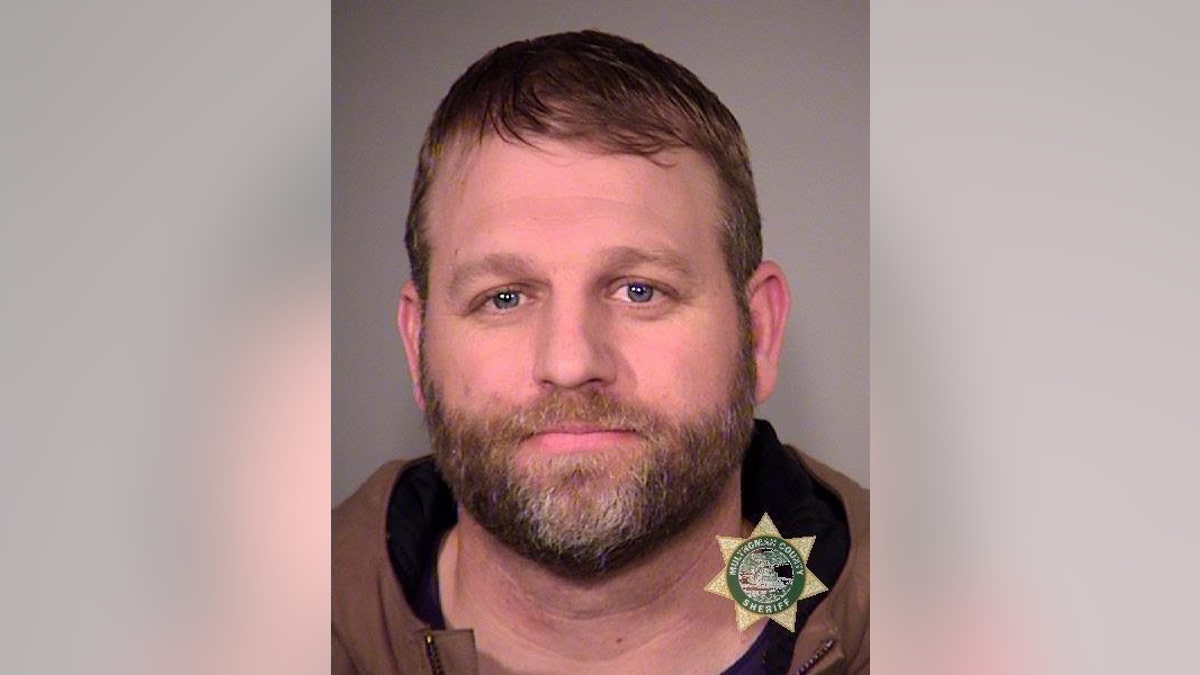
Ammon Bundy, 40, was arrested Tuesday. (Multnomah County Police)
The leader of an armed takeover of a national wildlife refuge took the witness stand in his own defense, tearfully telling jurors he was initially reluctant to get involved in the plight of two Oregon ranchers ordered to return to prison.
Ammon Bundy, 41, of Emmett, Idaho, wore blue jail scrubs Tuesday afternoon and had a copy of the U.S. Constitution in his front pocket. He has rejected the option of civilian clothes, contending he's a political prisoner.
When asked where he lives, he told the court: "Multnomah County Jail, maximum security."
The testimony quickly got more serious. Bundy testified he knew nothing about ranchers Dwight and Steven Hammond until his father, Cliven Bundy, asked if he was aware of their situation.
"I'm afraid what's happening to them is the same thing that happened to us," Bundy recalled his father saying, referring to the family's long fight with the government over federal lands and grazing fees, highlighted by a 2014 armed standoff with federal agents at Cliven Bundy's ranch near Bunkerville, Nevada.
"I told him, 'Dad, I can't fight another battle. We're doing the best we can to keep our family from going to prison."' Bundy said.
Bundy said that changed in early November 2015, when he clicked on an article about the Hammonds and became consumed by their case. He told the court he had and "overwhelming feeling it was my duty to get involved and protect this family."
Within days, he traveled to Harney County to meet the Hammonds and unsuccessfully press a local sheriff to shield them from federal authorities.
The Hammonds were convicted of an arson charge that carries a minimum prison sentence of five years. A federal judge, on his last day before retirement, decided it was too stiff and gave the men much lighter penalties.
Prosecutors won an appeal and the Hammonds returned to prison Jan. 4 to complete the mandatory minimum.
Bundy and six co-defendants, one of them is his brother Ryan, are charged with conspiring to impede Interior Department employees from doing their jobs during the 41-day occupation of the Malheur National Wildlife Refuge. The occupation began shortly after a Jan. 2 rally in support of the Hammonds and it grew into a wider call for the government to relinquish control of the refuge and other Western lands.
Bundy and his followers believe the federal government does not have a right to own land within a state, except for limited purposes, and only if it gets consent from the state and purchases the property.
Though she allowed Bundy to describe his beliefs, U.S. District Court Judge Anna Brown limited "narrative lectures" on land policy saying it's not relevant to the criminal case.
Bundy's attorney, Marcum Mumford, then questioned his client about the Bunkerville standoff. He played a video clip of his client getting shot three times with a stun gun as protesters clashed with federal agents near Cliven Bundy's ranch.
Mumford asked Bundy why he kept coming back for more after getting shocked by a Taser.
"Their actions were way out of line, way out of line," he said.
The judge reminded jurors they were not deciding the merits of the Bunkerville standoff, only its effect on Bundy's state of mind and if it played a role in his decision to occupy the federal land in Oregon.
Mumford asked Bundy about such a connection.
"It's definitely a piece of it," Bundy said.
Bundy and his father are both facing charges from the Bunkerville standoff and are scheduled to be tried in 2017.
Bundy is expected to return to the witness stand Wednesday.









































